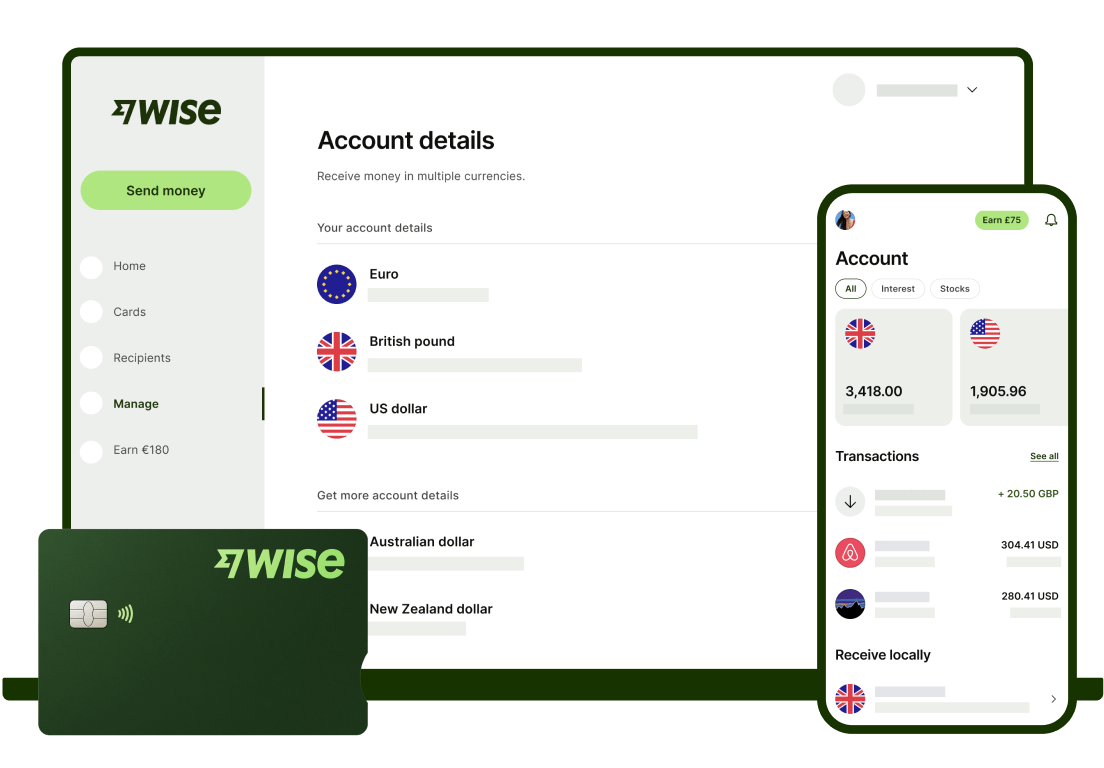Austria corporate tax - guide for international expansion
Learn about the corporate tax system in Austria, its current rates, how to pay your dues and stay compliant, and best practices.

Planning to launch a new business venture in Poland? It’s an attractive destination for foreign entrepreneurs, thanks to its central European location, business-friendly environment and skilled, highly educated workforce. It’s also a market that is open to foreign investment, with a stable economy and lots of opportunities for business growth.
But how easy is starting a business in Poland as a foreigner? Find out everything you need to know below, as we’ve put together a helpful guide to choosing a business structure, getting on the company register in Poland and much more.
We’ll also show you a smart way to manage your company’s finances in Poland, Europe and worldwide, using Wise Business - the ideal solution for international businesses.
💡 Learn more about Wise Business
Poland enjoys a strategically advantageous position right in the heart of central Europe, so it acts as a gateway for trading on the continent. This makes it a hugely attractive place to do business.
The country is also known for its stable economic growth, including resilience to the impact of unprecedented shocks like the Covid-19 pandemic. It offers well-developed infrastructure, a reliable banking sector and a relatively young, highly educated and skilled workforce - while also having lower labour costs than some countries.¹
If you’re looking for business opportunities in Poland, it could be worth looking at the sectors that have the biggest impact on the country’s economy. These are:²
- Automotive
- Aerospace
- Information technology hardware and software
- Food products
- Transportation
- Pharmaceuticals
- Paper production
- Appliances
- Financial services
- Business processing centres
- Research and development (R&D) operations.
As for the business culture in Poland, it’s pretty close to the UK. For example, the working week and business hours are very similar. Plus, many people speak English.³ This is another reason the Polish business environment is attractive for UK entrepreneurs. You will of course need to be sensitive to any slight differences in business etiquette in Poland compared to the UK.
One of the most crucial things you’ll need to do to set up your new business is to register it with the Polish company register.
Exactly where you’ll register depends on your business type.
For one-person companies, you only need to register at the Central Register and Information on Economic Activity (CEIDG). For civil law partnerships, it’s the National Official Business Register (REGON). For all other business types, it’s required to register at the National Court Register (Krajowy Rejestr Sądowy, or KRS).⁴
But first, you’ll need to decide on a legal structure for your new Polish company. There are quite a number of different business entities to choose from, including:
- One-person business activity
- Civil law partnership
- Limited liability company
- Joint-stock company
- General partnership
- Professional partnership
- Limited partnership
- Partnership limited by shares.
We’ll run through all of these business types below in a little more detail.
If you’re a sole trader (in business on your own), this is the structure to choose. You should register your business at the Central Register and Information on Economic Activity (CEIDG), and you don’t need Articles of Association. This kind of business is not a separate legal entity from its owner, who is liable for business debts and obligations.
This is a commercial agreement between two or more people, although the business is not a separate legal entity. So, partners bear full liability for the obligations and debts of the business. Civil partnerships require articles of partnership in writing, and must be registered at the National Official Business Register (REGON).
This is the most common business type in Poland, especially for foreign-owned companies. Liability of shareholders is capped at their contributions, but a minimum share capital of 5,000 PLN is required. Limited liability companies must have a management board, articles of association and be registered at the National Court Register (KRS).
Best suited to large businesses looking to be listed on the stock exchange, this company type can issue shares and bonds (so is suitable for large capital investments). There is limited liability for shareholders. Joint stock companies must be registered with the KRS and have statutes in the form of a notarial deed.
This is a non-capital-based company formed by a minimum of two partners. It requires articles of partnership in writing, and should be registered with the KRS. The partnership is a separate legal entity from its partners, but it does not have a legal personality.
This company type allows professionals in sectors such as law, architecture or medicine to conduct activities under a common name. It requires articles of partnership and registration with the KRS, and the company is a separate legal entity from its partners.
A limited partnership is formed by at least two people sharing the same business goals. It is a separate legal entity from its partners, and must be registered with the KRS along with articles of partnership in the form of a notarial deed.
This is a more complicated type of partnership, a kind of hybrid between general partnerships and joint-stock companies. The minimum amount of share capital required is 50,000 PLN. The company is a separate legal entity and must be registered with the KRS
To make it a little easier to get your new venture off the ground, here’s a step-by-step look at the process of setting up a company in Poland:⁵
To incorporate a company in Poland, you’re likely to need the following documents (depending on your company type):⁶
- ID documents and contact information for all relevant business partners
- Details and proof of address for the business location
- Information on the company’s proposed activity
- Articles of Association
- A Declaration by the management board that shareholder contributions have been made in full
- A list of shareholders
- A resolution of the shareholders’ meeting on the appointment of the management board
- A list of management board members and statement of consent to the appointment.
If you’re new to Poland or this is your very first business, you’re bound to have questions about setting up your new company. We’ll address some of these below, including average incorporation times and tax liability.
Poland is an attractive country in which to start a business, particularly for foreign entrepreneurs. It offers a skilled and educated workforce, low labour costs, a strategic central European location and stable economy. It also helps that the business culture is relatively similar to the UK, and that many people speak English.
For help setting up your new Polish business, a great resource is the Trade.gov.pl website.
The advantages of starting a business in Poland include the following:
- Access to trading in Europe and the Single Market
- Relatively low labour costs
- Access to skilled and educated workers
- Business-friendly environment, open to foreign investment
- Stable economy
- Diverse opportunities for business growth.
Although it can vary depending on your business type, the average time to incorporate a business in Poland is 3-5 days if you use the online portal option. If you choose to register your Polish company through the manual/notary system, it can take much longer at 4-6 weeks.⁵
It costs 600 Polish zloty (approx. £119 GBP) to register a company in Poland.⁵ Although bear in mind that there may be other fees and costs involved in the process of launching your company, particularly if you require legal services.
Check below the current conversion rate between GBP and PLN.
Wise Business account is a handy tool for UK business expanding abroad. Once you set up your business in Poland you can easily convert British Pounds to Polish złoty to hold money on the Polish currency or set payments like a local. All conversion is done based on the mid-market exchange rate with low and transparent fees.
Get started with Wise Business 🚀
The minimum amount of share capital required to set up a limited liability company in Poland is 5,000 PLN. For partnerships limited by shares, the minimum is 50,000 PLN.⁴
Yes, foreign citizens can register a company in Poland. However, as the UK is no longer an EU member state, you may need to fulfil additional conditions in order to start your business - or establish a branch office in Poland for your UK business instead.⁴
Having a Polish bank account could be useful for managing your new company’s finances, but it isn’t the only option. In fact, there are alternatives that could be more convenient and cost-effective too.

Open a Wise Business account and you can manage your company’s finances in 40+ currencies, including Polish zloty (PLN). You’ll be able to pay suppliers and staff in their own currency, as well as receiving payments in multiple currencies.
You can even automate payments using the powerful Wise API to save even more time. See how it works here in our case study
There are even Wise cards to cover business expenses, letting you and your team spend in any currency in 150+ countries across Europe and beyond.
Wise payments are fast and fully secure (even for large amounts). Best of all, you’ll only pay low, transparent fees and always get the mid-market exchange rate.
This is the rate that banks use to buy and sell currency, and is widely considered the fairest rate you can get. When banks carry out currency conversions on behalf of customers, they usually add a mark-up or margin to the exchange rate. This makes it more expensive for your business, as less of your money reaches your recipient.
It’s quick and easy to open a Wise Business account, with a fully digital application, verification and on-boarding process. Check out the requirements here.
Get started with Wise Business 🚀
And that’s it - all the essentials you need to know about Poland company formation from start to finish. We’ve covered business types, registration and how to get started, along with answers to commonly asked questions about starting a business in Poland from the UK. Good luck with your new venture!
Sources used for this article:
Sources checked on 22-Feb-2024
Disclaimer: The UK Wise Business pricing structure is changing with effect from 26/11/2025 date. Receiving money, direct debits and getting paid features are not available with the Essential Plan which you can open for free. Pay a one-time set up fee of £50 to unlock Advanced features including account details to receive payments in 22+ currencies or 8+ currencies for non-swift payments. You’ll also get access to our invoice generating tool, payment links, QuickPay QR codes and the ability to set up direct debits all within one account. Please check our website for the latest pricing information.
*Please see terms of use and product availability for your region or visit Wise fees and pricing for the most up to date pricing and fee information.
This publication is provided for general information purposes and does not constitute legal, tax or other professional advice from Wise Payments Limited or its subsidiaries and its affiliates, and it is not intended as a substitute for obtaining advice from a financial advisor or any other professional.
We make no representations, warranties or guarantees, whether expressed or implied, that the content in the publication is accurate, complete or up to date.

Learn about the corporate tax system in Austria, its current rates, how to pay your dues and stay compliant, and best practices.

Learn about the corporate tax system in Botswana, its current rates, how to pay your dues and stay compliant, and best practices.

Learn about the corporate tax system in Chile, its current rates, how to pay your dues and stay compliant, and best practices.

Learn about the corporate tax system in Montenegro, its current rates, how to pay your dues and stay compliant, and best practices.

Learn about the corporate tax system in Monaco, its current rates, how to pay your dues and stay compliant, and best practices

Learn about the corporate tax system in Costa Rica, its current rates, how to pay your dues and stay compliant, and best practices.